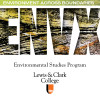main content Incremental Growth
Aaron Fellows, ’16, describes how the data assessment skills they learned in ENVS courses are in continued use, even in unexpected ways.

Like many, I have struggled to find places to apply my skills during the last two years of pandemic life. While isolating myself from the world, I decided to shift my career toward something which would directly address the climate crisis. This, it turns out, is a major undertaking. It has sometimes left me questioning whether I’m able to follow this path, and whether my skills really have value in approaching such a massive problem. Such mental low places are no fun to be in, and have become all-too common for me in recent memory.
In the midst of it all, however, I visited a small organic farm in Pennsylvania where my partner worked. I stayed on the farm for a few days, enjoyed the countryside atmosphere, and ate their produce. In exchange, they asked that I do a small amount of work to help the farm.
This was appealing to me, the child of a gardener, having spent much of my childhood digging in the ground toward both useful and frivolous ends. I had reflected on this during my senior year at Lewis & Clark, when I had the opportunity to participate in a blog-based mentorship program with incoming Environmental Studies students. I titled my final post during that project Dirt Under the Fingernails, in which I considered how my roots working the earth had informed my ENVS career as I grew into a concept-mapping data scientist.
It turned out that the help the farm needed wasn’t in weeding beds or bringing in the harvest. They knew about my data background, and asked for my help streamlining part of their ordering system, a complicated web of Excel spreadsheets. While certainly a few steps removed from my thesis research, the spreadsheets called to mind the hours I spent in the Dubach computer lab poring over tables of data exported from ArcMap, figuring out the most sensible ways to express meaning from the entropy before me.
After a few hours of work and a bit of additional research, I was able to reduce the mechanics of the farm’s process into a single, replicable spreadsheet. I had a good time learning about the way their farm works in the process, and they thanked me for my help. A few months later, they contacted me again to hire me to help them with another Excel problem—this time, tracking produce they were sending to and bringing back from their markets. I was once again able to streamline their data systems and simplify their administrative workload.
While I still aspire to find ways to bring my skills to bear addressing global-scale issues, this experience reminded me of the value of small-scale problem-solving. Improving informational systems while growing a relationship with a small farm was a rewarding reminder of the value of the skills I have gained. I fully intend to continue seeking opportunities to address the largest problems we face as a global society, but in the meantime, it helps me to remember to celebrate what I can accomplish along the way.
Environmental Studies is located in room 104 of Albany Quadrangle on the Undergraduate Campus.
MSC: 62
email envs@lclark.edu
voice 503-768-7790
Symposium Advisor Jim Proctor
Environmental Studies
Lewis & Clark
615 S. Palatine Hill Road
Portland OR 97219
More Stories

Farming, Oceanography, and the Arctic
Rylie Neely ’20 shares how she continued to use her ENVS education during an unplanned career pause due to Covid.
2025 Project Descriptions for the Rogers Program
Summer science research opportunities

Finding Paths
ENVS alum, Julian Brastow ’22, describes his initial job search after graduating from LC.

Place-Based Learning
From Trash to Treasure: Creating Art From Waste
Cara Tomlinson’s Art and Ecology class uses waste materials from around Portland to create beautiful and meaningful works of art. This course offers a fresh approach to creative practice, merging art and ecology to help students respond to the climate crisis, explore the agency of materials, and build connections to place.
